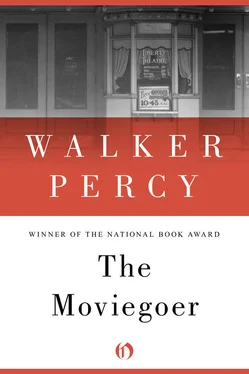Every moment think steadily as a Roman and a man, to do what thou hast in hand with perfect and simple dignity, and a feeling of affection and freedom and justice. These words of the Emperor Marcus Aurelius Antoninus strike me as pretty good advice, for even the orneriest young scamp.
My apartment is as impersonal as a motel room. I have been careful not to accumulate possessions. My library is a single book, Arabia Deserta. The television set looks as if it took coins. On the wall over the bed hang two Currier and Ives prints of ice-skaters in Central Park. How sad the little figures seem, skimming along in step! How sad the city seems!
I switch on television and sit directly in front of it, bolt upright and hands on knees in my ladder-back chair. A play comes on with Dick Powell. He is a cynical financier who is trying to get control of a small town newspaper. But he is baffled by the kindliness and sincerity of the town folk. Even the editor whom he is trying to ruin is nice to him. And even when he swindles the editor and causes him to have a heart attack from which he later dies, the editor is as friendly as ever and takes the occasion to give Powell a sample of his homespun philosophy. “We’re no great shakes as a town,” says the editor on his deathbed, teetering on the very brink of eternity. “But we’re friendly.” In the end Powell is converted by these good folk and instead of trying to control the paper, applies to the editor’s daughter for the job of reporter so he can fight against political corruption.
It is time to pick up Kate.
3
TONIGHT, THURSDAY NIGHT, I carry out a successful experiment in repetition.
Fourteen years ago, when I was a sophomore, I saw a western at a moviehouse on Freret Street, a place frequented by students and known to them as the Armpit. The movie was The Oxbow Incident and it was quite good. It was about this time of year I saw it, for I remember the smell of privet when I came out and the camphor berries popping underfoot. (All movies smell of a neighborhood and a season: I saw All Quiet on the Western Front, one of my first, in Arcola, Mississippi, in August of 1941, and the noble deeds were done, not merely fittingly but inevitably, in the thick singing darkness of Delta summer and in the fragrance of cottonseed meal.) Yesterday evening I noticed in the Picayune that another western was playing at the same theater. So up I went, by car to my aunt’s house, then up St Charles in a streetcar with Kate so we can walk through the campus.
Nothing had changed. There we sat, I in the same seat I think, and afterwards came out into the smell of privet. Camphor berries popped underfoot on the same section of broken pavement.
A successful repetition.
What is a repetition? A repetition is the re-enactment of past experience toward the end of isolating the time segment which has lapsed in order that it, the lapsed time, can be savored of itself and without the usual adulteration of events that clog time like peanuts in brittle. Last week, for example, I experienced an accidental repetition. I picked up a German-language weekly in the library. In it I noticed an advertisement for Nivea Creme, showing a woman with a grainy face turned up to the sun. Then I remembered that twenty years ago I saw the same advertisement in a magazine on my father’s desk, the same woman, the same grainy face, the same Nivea Creme. The events of the intervening twenty years were neutralized, the thirty million deaths, the countless torturings, uprootings and wanderings to and fro. Nothing of consequence could have happened because Nivea Creme was exactly as it was before. There remained only time itself, like a yard of smooth peanut brittle.
How, then, tasted my own fourteen years since The Oxbow Incident?
As usual it eluded me. There was this: a mockery about the old seats, their plywood split, their bottoms slashed, but enduring nevertheless as if they had waited to see what I had done with my fourteen years. There was this also: a secret sense of wonder about the enduring, about all the nights, the rainy summer nights at twelve and one and two o’clock when the seats endured alone in the empty theater. The enduring is something which must be accounted for. One cannot simply shrug it off.
“Where to now?” asks Kate. She stands at my shoulder under the marquee, plucking at her thumb and peering into the darkness.
“Wherever you like.”
“Go on about your business.”
“Very well.”
She saw Merle Mink this afternoon and seems to feel better for it. He approved her breaking her engagement with Walter and set up a not very rigorous schedule of office visits. Most important, she no longer feels she is coming near the brink of an abyss. “But the trouble is,” she said gloomily as we sat in the theater waiting for the lights to go out, “I am always at my best with doctors. They are charmed with me. I feel fine when I’m sick. It is only when I’m well that—” Now in the shadow of the camphor tree she stops suddenly, takes my arm in both hands. “Have you noticed that only in time of illness or disaster or death are people real? I remember at the time of the wreck — people were so kind and helpful and solid. Everyone pretended that our lives until that moment had been every bit as real as the moment itself and that the future must be real too, when the truth was that our reality had been purchased only by Lyell’s death. In another hour or so we had all faded out again and gone our dim ways.”
We wander along the dark paths of the campus and stop off at my weedy stoop behind the laboratory. I sit on the concrete step and think of nothing. Kate presses her bleeding thumb to her mouth. “What is this place?” she asks. A lamp above the path makes a golden sphere among the tree-high shrubs.
“I spent every afternoon for four years in one of those laboratories up there.”
“Is this part of the repetition?”
“No.”
“Part of the search?”
I do not answer. She can only believe I am serious in her own fashion of being serious: as an antic sort of seriousness, which is not seriousness at all but despair masquerading as seriousness. I would as soon not speak to her of such things, since she is bound to understand it as a cultivated eccentricity, like the eccentricity of the roommate she used to talk about: “A curious girl, BoBo. Do you know what she liked to do? Collect iron deer. She located every iron deer in Westchester County and once a month she’d religiously make her rounds and pay them a visit — just park and look at them. She had names for each one: Tertullian, Archibald MacLeish, Alf Landon — she was quite serious about it.” I have no use at all for girls like BoBo nor for such antic doings as collecting iron deer in Westchester County.
“Why don’t you sit down?” I ask her irritably.
“Now the vertical search is when—”
(Am I irritable because, now that she mentions it, I do for a fact sound like BoBo and her goddamn iron deer?)
“If you walk in the front door of the laboratory, you undertake the vertical search. You have a specimen, a cubic centimeter of water or a frog or a pinch of salt or a star.”
“One learns general things?”
“And there is excitement to the search.”
“Why?” she asks.
“Because as you get deeper into the search, you unify. You understand more and more specimens by fewer and fewer formulae. There is the excitement. Of course you are always after the big one, the new key, the secret leverage point, and that is the best of it.”
“And it doesn’t matter where you are or who you are.”
“No.”
“And the danger is of becoming no one nowhere.”
“Never mind.”
Kate parses it out with the keen male bent of her mind and yet with her woman’s despair. Therefore I take care to be no more serious than she.
Читать дальше












